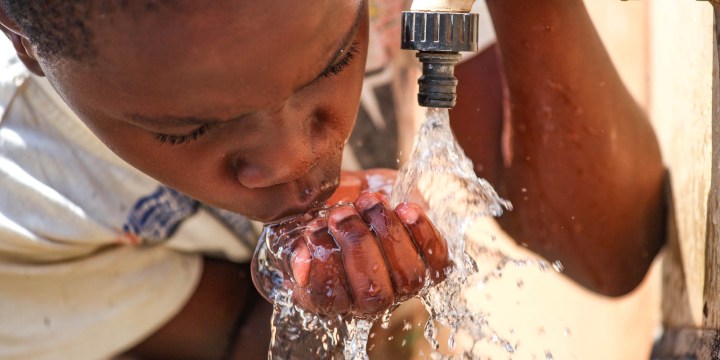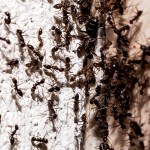WORLD WATER DAY
Three ‘tectonic’ events that changed the way South Africans regard the management of a crucial asset

Water scientist Dr Anthony Turton told a webinar that the July 2021 riots provided two of the three key moments that had driven citizens to be more proactive in affairs that were meant to be undertaken by the government, such as water management.
Outspoken water scientist Dr Anthony Turton believes the July 2021 unrest was one of three significant events in South Africa that have fundamentally changed the relationship between citizens and government, and that this will have a profound impact on how South Africa’s limited water resources are managed in the future.
Turton was a panellist at a webinar on Tuesday, hosted by the Water Community Action Network (WaterCAN), an initiative of the non-profit lobby group the Organisation Undoing Tax Abuse (Outa), in commemoration of World Water Day.
He said that the riots provided two of the three key moments that had driven citizens to be more proactive in affairs that were meant to be undertaken by the government, such as water management:
“The most important thing that happened there was the citizens drew a line…. realised that the state is unable to deal with its own core responsibilities… unable to project authority over the citizens.
“Part of that was the breakdown of services in general, of which water provision is a very important subset. I would say the KZN riots have reset the strategic map in South Africa, because it’s made people realise that government is not monolithic… in many cases, government is absent.. unable to actually do anything about it. So that is the first wake-up call. And that feeds into what you [at WaterCAN are] starting to do now with your citizen scientist initiative.”
July looting panel confirms what we knew: SA was failed by the ANC, government and security cluster
According to Outa, WaterCAN aims to help “citizen scientists”, essentially ordinary volunteers, conduct water quality tests throughout the country and then make this data publicly available.
The open data source aims to empower residents to provide oversight of the government’s own testing regime and could be used to help communities challenge South Africa’s water authorities in various forums, including the courts if necessary.
Citizen action is the key to rescuing South Africa’s failing water and sanitation systems
Another “tectonic shift” involving the unrest was the associated rioting and looting that led to the torching of the warehouse belonging to the chemical company UPL.
“The UPL fire, in my view, has been an absolute watershed moment because not only did it release massive amounts of toxins into the environment, but importantly [those toxins] entered the aquatic ecosystem. And the chemicals that were involved, they have such a nature that, in all probability, you’re going to see recycling of those toxins in the ecosystem probably for the next generation.”
Outrage over UPL plan to dump more toxic waste into Durban’s sea
Turton said the third “big tectonic event” was the Emfuleni Municipality sewage crisis.
“There, we saw a breakdown in wastewater management. And we saw something like R2-billion being invested into fixing that. The Department of Water and Sanitation was unable to fix it so they deployed the army. They were not able to fix it, and we are no closer to any solution. It is clear that government on its own cannot fix it.”
The Emfuleni sits on the Vaal River System, categorised by Turton as the single most important river system in South Africa. It sustains approximately 40% of the country’s human population and covers a region that accounts for about 60% of GDP.
‘A story of South Africa’: Emfuleni residents fed up with Vaal River pollution inertia
The South African public now has a “very strong desire to hold elected officials accountable”, said Turton.
“If you can’t hold elected officials accountable, then, of course, this kind of anarchy breaks out.”
Raising the stakes even further was that if South Africa wanted to absorb the so-called born-frees into the mainstream economy and allow them to meet their ambitions, it would need to find “new water resources that currently don’t exist”.
South Africa’s total available water is approximately 48 billion cubic metres. In order to absorb the born-frees, this amount would need to increase to at least 63 billion cubic metres by 2030.
Turton said this challenge was made more difficult given that total water availability was decreasing.
“New water will need to be from wastewater recovery. In the next decade, we have to mobilise two-thirds of the volume of water that we managed to mobilise from the 1960s. It is a massive, massive task. But it’s a doable task.”
The government needed to act with intent, said Turton, or face being ousted from power in 2024.
He said each unit of water would need to be recycled 1.6 times by 2030, and if pollution was not brought under control the costs of water treatment would increase exponentially.
Samson Mokoena is a coordinator at the Vaal Environmental Justice Alliance, which has been campaigning for environmental justice on the Vaal River System since the 1990s. Mokoena said that despite the South African Humans Rights Commission’s (SAHRC) report into pollution in the Vaal, and despite the Department of Water and Sanitation sending its deputy minister to engage with affected communities, there were still concerns that the recommendations made in the report would not be met because of “political interference”.
The 2021 SAHRC report found that the Vaal was polluted “beyond acceptable levels”, thus affecting natural ecosystems and endangering health. It said “kilolitres” of untreated sewage flow into the Vaal as a result of “dilapidated” wastewater treatment plants that are unable to process raw sewage.
Putting a cork into South Africa’s overflowing sewage crisis
Said Mokoena: “The big question is also about resources. To fix the entire problem will cost about R7-billion… are we willing to spend that money and make sure that the situation is going to be fixed?”
Ntswaki Ditlhale runs an environmental water organisation called Triple-P. She said the key to getting people involved in protecting their water systems was to make them understand why the systems are important. She said this was easier in rural communities that exist alongside rivers.
Triple-P works in mostly rural and peri-urban environments and trains communities to become citizen scientists.
“When we move into more urban areas, we experience a complete disconnection. And that’s the area we need to start to bring people back to connecting with the environment, and really starting to value the water,” said Ditlhale. DM





















 Become an Insider
Become an Insider
Comments - Please login in order to comment.